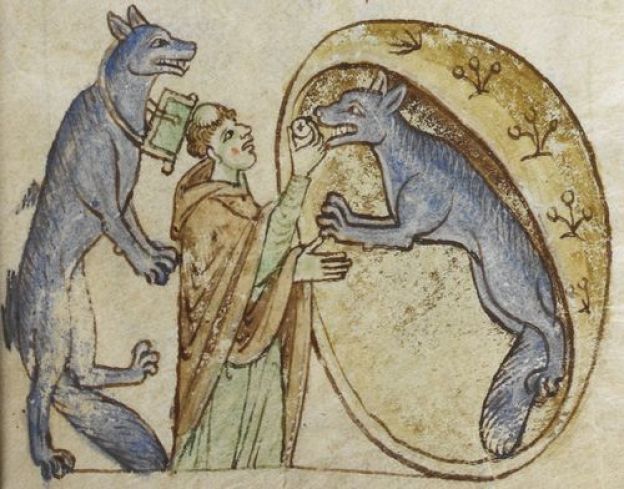In the second century CE, Pausanias composed ten books on the sights and wonders of ancient Greece. His text provides some of the only accounts of architecture, art and culture that have been lost in intervening centuries. In his eighth book, he turns to Arcadia and starts by discussing the rituals performed in honor of Lykian Zeus.
The story, mentioned by Plato too, is one of those ‘original sin’ tales from Greek myth–like the story of Tantalos and Pelops, it hearkens back to a golden age when gods and men hung out together. Its details about werewolves are similar to those offered by Pliny (especially the 9-10 year period as a wolf).
It turns out that recent archaeological studies may support human sacrifice at the site!
Pausanias, 8.2.3-7
“Cecrops was the first to declare Zeus the Highest god and he thought it wrong to sacrifice anything that breathed, so he burned on the altar the local cakes which the Athenians call pelanoi even today. But Lykaon brought a human infant to the altar of Lykaian Zeus, sacrificed it, spread its blood on the altar, and then, according to the tale, turned immediately from a man into a wolf.
This tale convinces me for the following reasons: it has circulated among the Arcadians since antiquity and it also seems probable. For in those days men were guests and tablemates of the gods because of their just behavior and reverence. Those who were good received honor openly from the gods; divine rage fell upon the unjust—then, truly, gods were created from men, gods who have rites even today such as Aristaios, Britomartis the Cretan, Herakles the son of Alkmene, Amphiaros the son of Oicles and, finally, Kastor and Polydeukes.
For this reason we should entertain that Lykaon was turned into a beast and that Niobe became a stone. In our time, when wickedness has swelled to its greatest size and looms over every land and city, no god can come from men, except in the blandishment offered to rulers. Today, divine rage lies in wait for the wicked when they leave for the lower world.
In every age many ancient events—and even those that are current—end up disbelieved because of those who create lies by using the truth. Men report that since the time of Lykaon a man always transforms from a human into a wolf at the sacrifice of Lykaian Zeus, but that he doesn’t remain a wolf his whole life. Whenever someone turns into a wolf, if he refrains from human flesh, people say he can become a man again ten years later. But if he does taste it, he will always remain a beast.”
ὁ μὲν γὰρ Δία τε ὠνόμασεν ῞Υπατον πρῶτος, καὶ ὁπόσα ἔχει ψυχήν, τούτων μὲν ἠξίωσεν οὐδὲν θῦσαι, πέμματα δὲ ἐπιχώρια ἐπὶ τοῦ βωμοῦ καθήγισεν, ἃ πελάνους καλοῦσιν ἔτι καὶ ἐς ἡμᾶς ᾿Αθηναῖοι· Λυκάων δὲ ἐπὶ τὸν βωμὸν τοῦ Λυκαίου Διὸς βρέφος ἤνεγκεν ἀνθρώπου καὶ ἔθυσε τὸ βρέφος καὶ ἔσπεισεν ἐπὶ τοῦ βωμοῦ τὸ αἷμα, καὶ αὐτὸν αὐτίκα ἐπὶ τῇ θυσίᾳ γενέσθαι λύκον φασὶν ἀντὶ ἀνθρώπου.
καὶ ἐμέ γε ὁ λόγος οὗτος πείθει, λέγεται δὲ ὑπὸ ᾿Αρκάδων ἐκ παλαιοῦ, καὶ τὸ εἰκὸς αὐτῷ πρόσεστιν. οἱ γὰρ δὴ τότε ἄνθρωποι ξένοι καὶ ὁμοτράπεζοι θεοῖς ἦσαν ὑπὸ δικαιοσύνης καὶ εὐσεβείας, καί σφισιν ἐναργῶς ἀπήντα παρὰ τῶν θεῶν τιμή τε οὖσιν ἀγαθοῖς καὶ ἀδικήσασιν ὡσαύτως ἡ ὀργή, ἐπεί τοι καὶ θεοὶ τότε ἐγίνοντο ἐξ ἀνθρώπων, οἳ γέρα καὶ ἐς τόδε ἔτι ἔχουσιν ὡς ᾿Αρισταῖος καὶ Βριτόμαρτις ἡ Κρητικὴ καὶ ῾Ηρακλῆς ὁ ᾿Αλκμήνης καὶ ᾿Αμφιάραος ὁ ᾿Οικλέους, ἐπὶ δὲ αὐτοῖς Πολυδεύκης τε καὶ Κάστωρ.
οὕτω πείθοιτο ἄν τις καὶ Λυκάονα θηρίον καὶ τὴν Ταντάλου Νιόβην γενέσθαι λίθον. ἐπ’ ἐμοῦ δὲ—κακία γὰρ δὴ ἐπὶ πλεῖστον ηὔξετο καὶ γῆν τε ἐπενέμετο πᾶσαν καὶ πόλεις πάσας—οὔτε θεὸς ἐγίνετο οὐδεὶς ἔτι ἐξ ἀνθρώπου, πλὴν ὅσον λόγῳ καὶ κολακείᾳ πρὸς τὸ ὑπερέχον, καὶ ἀδίκοις τὸ μήνιμα τὸ ἐκ τῶν θεῶν ὀψέ τε καὶ ἀπελθοῦσιν ἐνθένδε ἀπόκειται. ἐν δὲ τῷ παντὶ αἰῶνι πολλὰ μὲν πάλαι συμβάντα, <τὰ> δὲ καὶ ἔτι γινόμενα ἄπιστα εἶναι πεποιήκασιν ἐς τοὺς πολλοὺς οἱ τοῖς ἀληθέσιν ἐποικοδομοῦντες ἐψευσμένα. λέγουσι γὰρ δὴ ὡς Λυκάονος ὕστερον ἀεί τις ἐξ ἀνθρώπου λύκος γίνοιτο ἐπὶ τῇ θυσίᾳ τοῦ Λυκαίου Διός, γίνοιτο δὲ οὐκ ἐς ἅπαντα τὸν βίον· ὁπότε δὲ εἴη λύκος, εἰ μὲν κρεῶν ἀπόσχοιτο ἀνθρωπίνων, ὕστερον ἔτει δεκάτῳ φασὶν αὐτὸν αὖθις ἄνθρωπον ἐκ λύκου γίνεσθαι, γευσάμενον δὲ ἐς ἀεὶ μένειν θηρίον.








